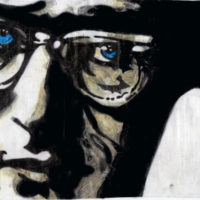by Nick DeRiso
The pianist, of course, got all the press. But Scott Lafaro, this tragic genius in a unique counter-melodic style, is the one who so often gets forgotten.
If you care anything about bass (rock, jazz or blues) you will find his recordings with Bill Evans at New York City’s Village Vanguard … and you will study them. LaFaro performed for just six years between 1955-61, yet he moved this instrument into a whole new place.
It’s didn’t hurt that LaFaro was working with the Jersey-born, Hammond, La.-schooled Evans — who had attended Southeastern on a flute scholarship. Evans was, even then, famous for his delicate, yet dramatic contributions with Miles Davis (a stint that included the best-selling acoustic jazz album of all time, “Kind of Blue”), yet he ended up doing his most important work with LaFaro.
And, like those previous bursts of swinging radiance, this too was recorded all in one day — though, what was once a single concert would become the foundation of two vintage releases. First came “Sunday at the Village Vanguard” (which is more heavily weighted with bass) and then “Waltz for Debby” (a ballad album, with more piano), both made with drummer Paul Motian.
Evans found, with LaFaro, an improbable relationship, one based on simulatanous composition and improv. It’s both melodic and rhythmic, like two thoughts running through your mind.
Just that quickly, however, it was finished. Tens days after their two-year relationship culminated with these landmark live recordings, LaFaro was killed in an auto accident — sending a depressed and broken Evans into a tailspin. Evans didn’t perform publicly for nearly a year, and didn’t make make any important records for longer still. Even then, he never reached the same astounding, and artistically sympathetic, heights with a bass player again.
In fact, after Lafaro died, I think I like Evans’ duets with folks like saxman Cannonball Adderley and guitarist Jim Hall best of all.
LaFaro passed having never fronted his own record. Still, he remains one of the most important bassists of jazz’s first 50 years — if only because LaFaro was the first to move his instrument from out back.
There are — on those albums with Evans, in particular — the makings of a whole new sound, one based on challenge and response, from inside the larger band dynamic. LaFaro’s stirring complexity was short lived, but timeless.
- Nick DeRiso’s Best of 2015 (Rock + Pop): Death Cab for Cutie, Joe Jackson, Toto + Others - January 18, 2016
- Nick DeRiso’s Best of 2015 (Blues, Jazz + R&B): Boz Scaggs, Gavin Harrison, Alabama Shakes - January 10, 2016
- Nick DeRiso’s Best of 2015 (Reissues + Live): John Oates, Led Zeppelin, Yes, Faces + others - January 7, 2016



